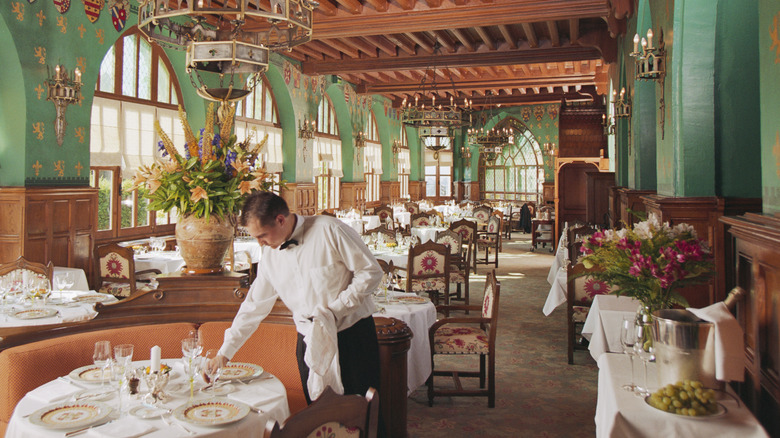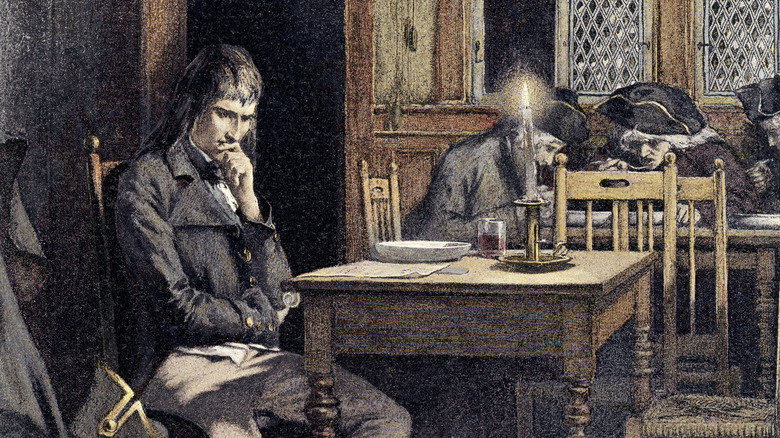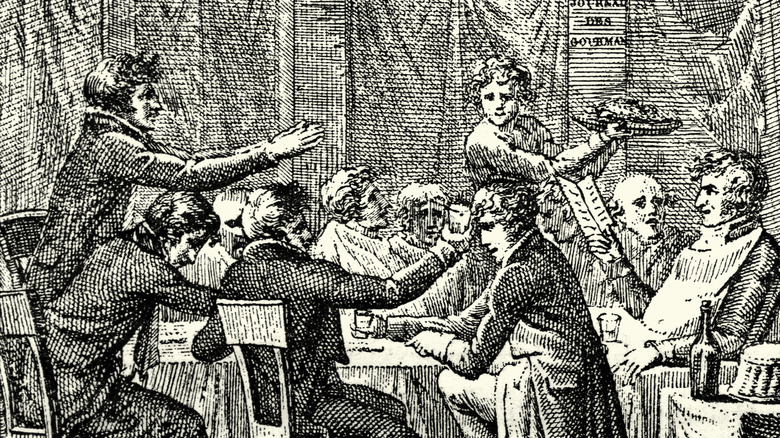Fun Fact: The First Modern Restaurant Started As A Wellness Center
Sharing experiences over food has been a thing for a long time, but it turns out that it took a while for everything to coalesce into the restaurant experiences of today's world. We're not even talking about menus accessed by QR codes or ordering ahead via an app; we're talking about things like menus, orders taken by waitstaff, and places that offer choices as to what you're being served. It sounds so everyday that it's hard to imagine a world without it, but it turns out that the word "restaurant" was only coined in the 1700s. In the grand scheme of human history, that's not long ago.
Parts of the restaurant concept date back to ancient Assyria, and the first menu ever discovered was carved on a stone tablet. More recently, businesses serving the cuisine of the 12th-century Song Dynasty popped up along trade routes in China, giving merchants and traders a chance to eat at a place that was serving their own local cuisine, even when they were far from home.
But what about the first time the word "restaurant" was used in reference to a place serving food to customers? Initially, customers weren't necessarily looking for a meal; they were looking for medicine and healing. The very first location that earned the name "restaurant" opened in 1765, and it was named for the "restorative broth" that it sold to the masses of Paris.
The first restaurant sold broth and promises to alleviate stomach ailments
We're used to seeing all kinds of catchy advertising and marketing slogans today, and when this newfangled thing called a restaurant opened on Paris's Rue des Poulies in 1765, it had a slogan, too. When translated from Latin, it was a Biblical verse that read, "Come to me, those whose stomachs ache, and I will restore you."
And that was the idea. The dishes sold were called "restauran," and menu items were meant to be health tonics, restoratives, and digestives. These places were also called health houses and bouillon restaurants after their trademark dishes of seasoned broth and vegetables. Did this magical, mystical broth do what it claimed? Likely, yes. Broth-based soups have since been named one of the foods to cure stomachaches, digestive complaints, and illnesses by providing easy-to-digest nutrients, fluids, and electrolytes.
What happened next is a little iffy, but it seems as though, along with the broth, early restaurants also specialized in poultry dishes that ended up going 18th-century viral. Owners realized there was a market for this and that if they made it possible for anyone to walk in at any time, ask for what they wanted, and sit down to eat it, there was a fortune to be made. They were right, and after the French Revolution's execution of the nobility left many people without work, personal chefs pivoted to cooking for the public in these newly formed establishments. The rest is history.
The oft-told story about France's first restaurant likely isn't true
It makes sense that restaurants would have become wildly popular. Most people got their meals from street vendors (who still sell some of the most iconic foods any traveler needs to try), taverns or inns, and restaurants helped change the game. It seems, though, that an oft-told tale regarding one of these early restaurants might not be true.
Mid-18th century France was governed by strict regulations. Butchers, for example, could only handle meat, which made food prep in a restaurant difficult — until a soup salesman named Boulanger designed new methods of cooking that walked a very thin regulatory line that allowed him to create new dishes to sell in his trendy new restaurant. The problem with this story is that when Indiana University Bloomington researcher Rebecca Spang tried to find more concrete information about this mysterious salesman, she found the opposite: Specifically, she found no evidence he was ever a real person.
Spang told National Geographic that while she's hesitant to say without a doubt Boulanger was fictional, in all her deep dive through historical records, there was no such person. There was, however, Mathurin Roze de Chantoiseau, who was credited with establishing a food service setup that involved clearly posted menus and pricing, with dishes served at individual tables instead of communal ones. Restaurants became a place to show you were enlightened, elegant, and part of the new French class system.


